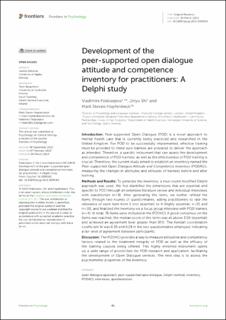Development of the peer-supported open dialogue attitude and competence inventory for practitioners: A Delphi study
Journal article, Peer reviewed
Published version
Permanent lenke
https://hdl.handle.net/11250/3104235Utgivelsesdato
2023Metadata
Vis full innførselSamlinger
Sammendrag
Introduction: Peer-supported Open Dialogue (POD) is a novel approach to mental health care that is currently being practiced and researched in the United Kingdom. For POD to be successfully implemented, effective training must be provided to make sure trainees are prepared to deliver the approach as intended. Therefore, a specific instrument that can assess the development and competence of POD trainees, as well as the effectiveness of POD training is crucial. Therefore, the current study aimed to establish an inventory named the Peer-supported Open Dialogue Attitude and Competence Inventory (PODACI), measuring the changes in attributes and attitudes of trainees before and after training.
Methods and Results: To generate the inventory, a four-round modified Delphi approach was used. We first identified the dimensions that are essential and specific to POD through an extensive literature review and individual interviews with practitioners (n = 8). After generating the items, we further refined the items through two rounds of questionnaires, asking practitioners to rate the relevance of each item from 1 (not essential) to 4 (highly essential; n = 21 and n = 10), and finalized the inventory via a focus group interview with POD trainers (n = 4). In total, 76 items were included in the PODACI. A good consensus on the items was reached: the median score of the items was all above 3.00 (essential) and achieved an agreement level greater than 85%. The Kendall coordination coefficient W was 0.36 and 0.28 in the two questionnaires employed, indicating a fair level of agreement between participants.
Discussion: The PODACI provides a way to measure attitudinal and competency factors related to the treatment integrity of POD as well as the efficacy of the training courses being offered. This highly enriched instrument opens up a wide range of possibilities for POD research and application, facilitating the development of Open Dialogue services. The next step is to assess the psychometric properties of the inventory.

